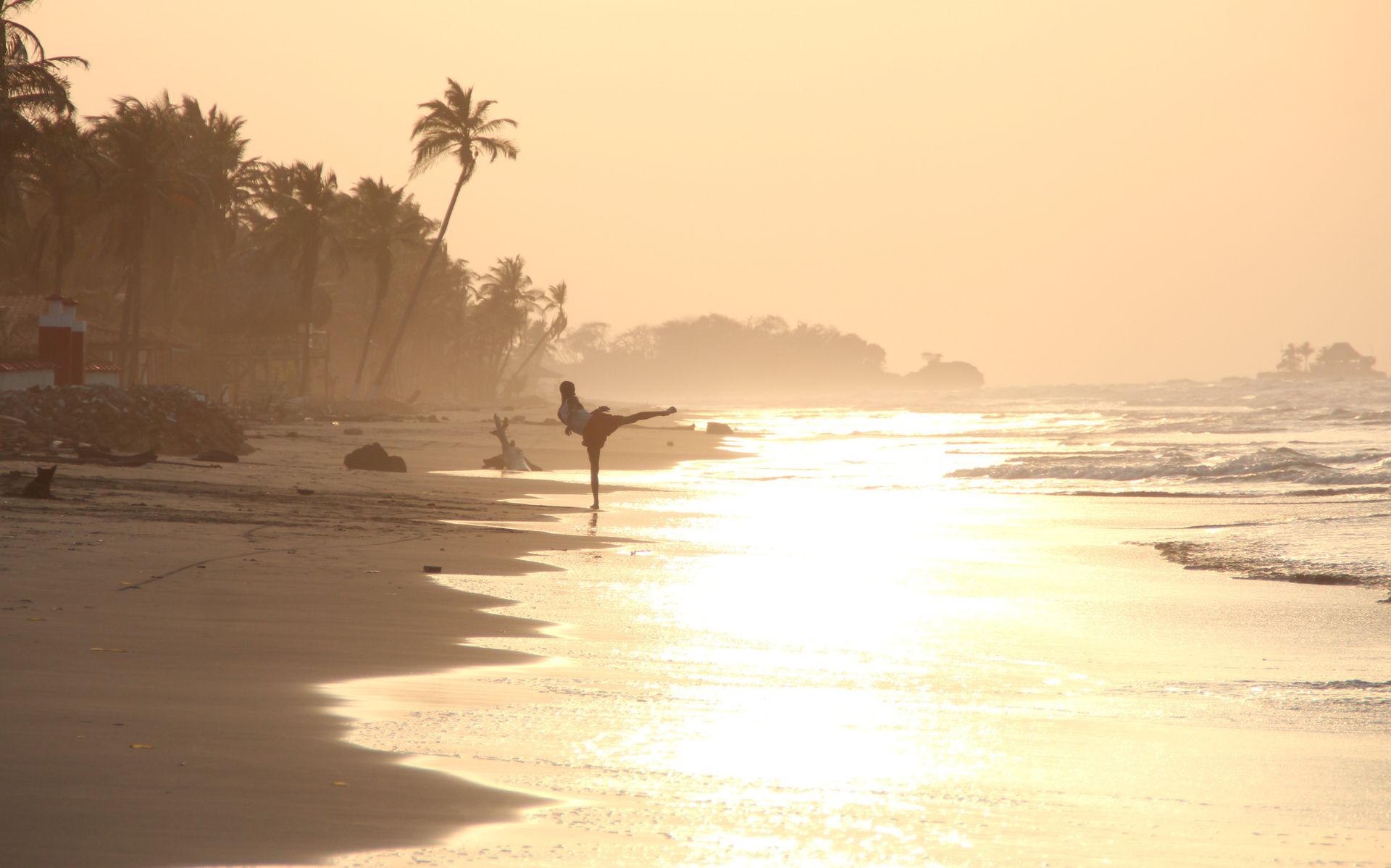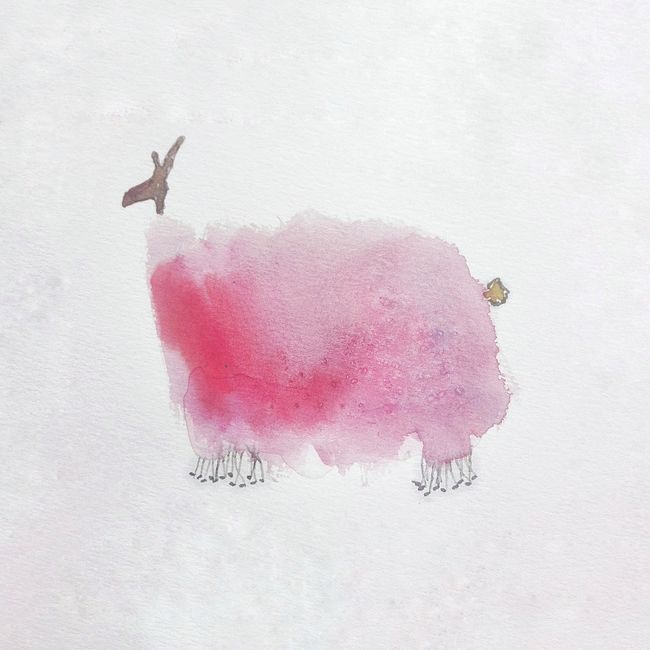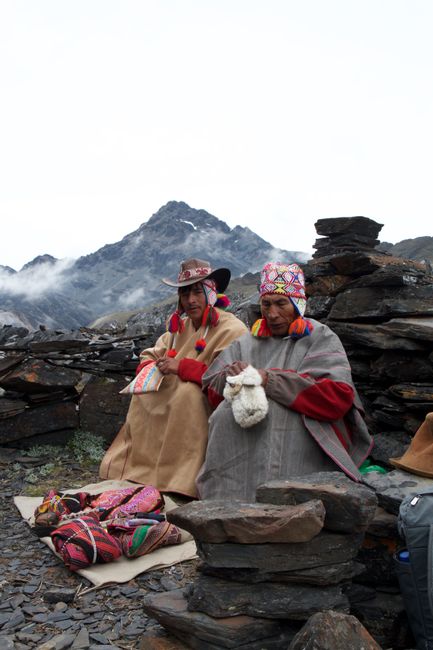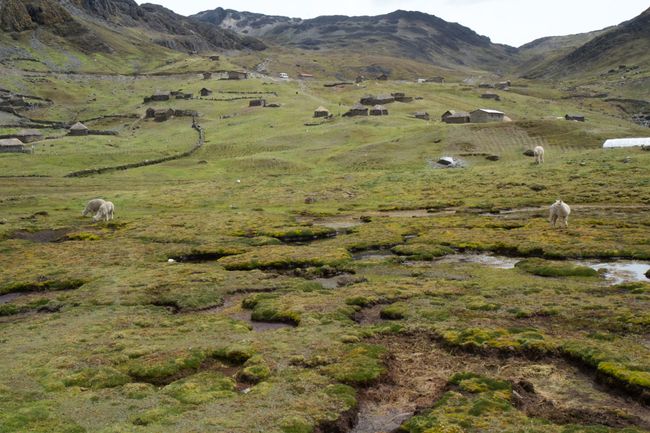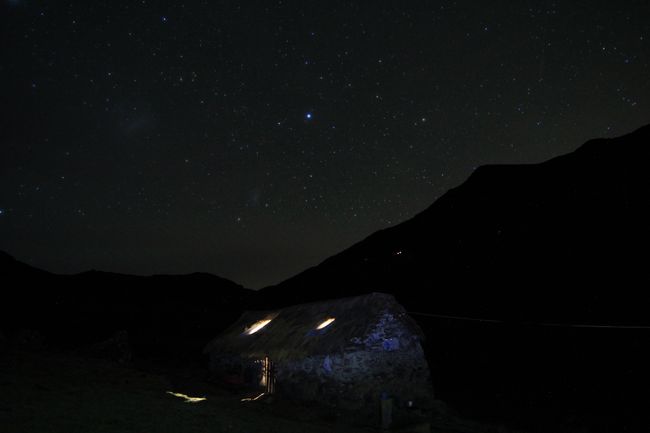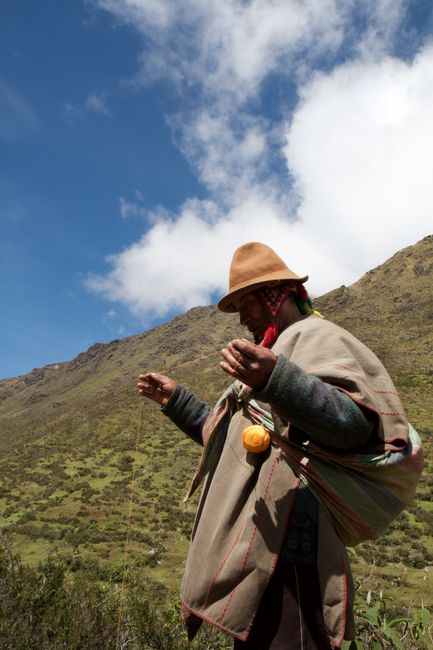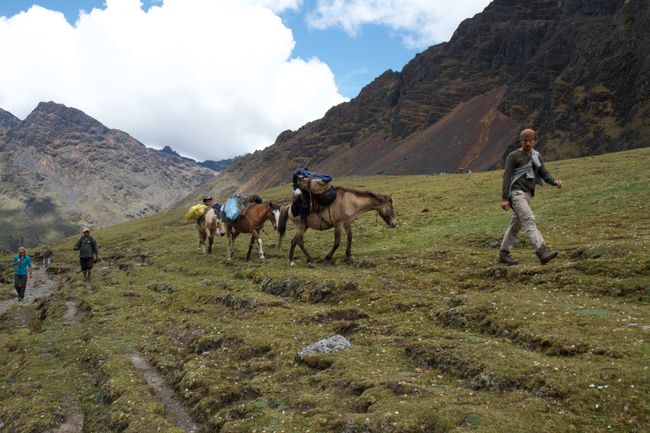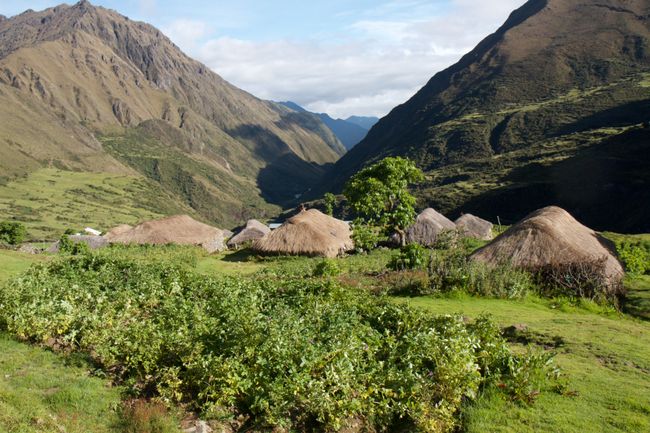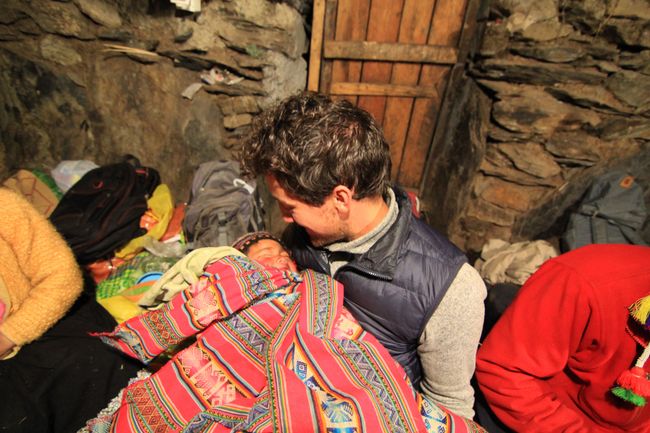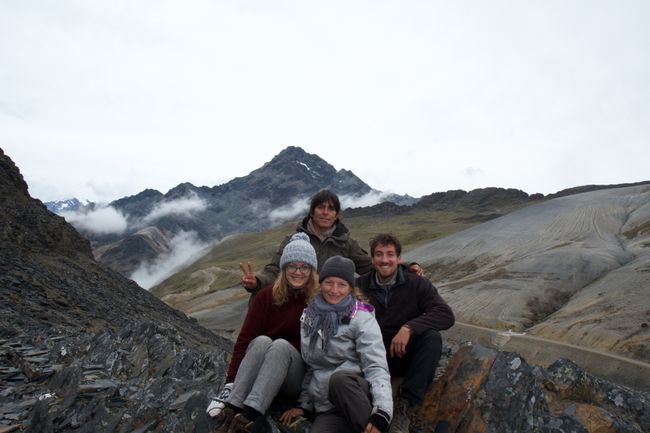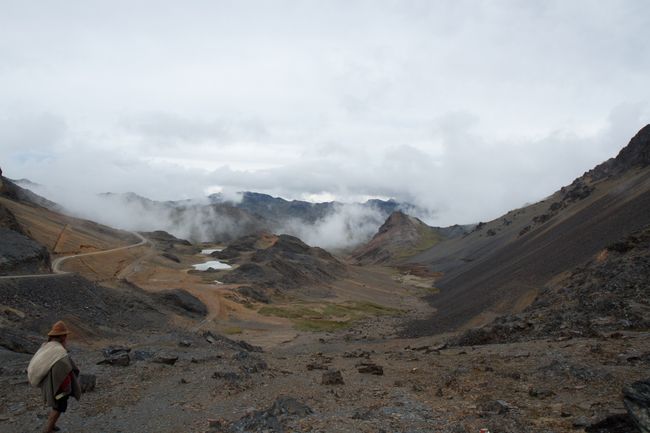The Q'eros - A Tale
Publié: 18.12.2018
S'inscrire à la Newsletter
The chaotic tiendas by the roadside become less frequent, the noise of the city slowly subsides. The car chugs along the narrow paths, up the mountains. Up here in the rugged, almost untouched beauty of the Andes, the roads seem like brutal wounds inflicted on the mountains to subjugate their integrity to human needs. In the distance, thick smoke rises. A burning car? A crashed small plane? The smoke gives it away. A sense of unease washes over me, eventually giving way to awe in the face of this immense nature.
We are on our way to the Q'eros, the last direct descendants of the Incas, as they are often called. We, that is Paul, my adventurous friend, who is attracted to the spiritual closeness to nature. Theresa, a quiet young woman we met a week ago on a free walking tour and who is interrupting her volunteer service in a yoga retreat in the Sacred Valley for this experience. Kenner, our Peruvian guide on the city tour, who made it possible for us to make this trip to the Q'eros. Normally, it is very difficult for tourists to get insight into the life of this people, only scientists come to them to study their way of life, which is said to be very similar to that of the Incas. Kenner has a godchild in the Q'eros family who will take us in, and he himself has not been there for a long time. He sensed our genuine interest, especially in the healer living in the village, but initially said that such an encounter should not be forced, rather the healer should find us. A few seconds after he said this to us in a restaurant in the bustling city of Cusco, his phone rang. It was Luis, the healer's son and a good friend of Kenner's. From that moment on, the plans for our trip were made. Kenner is a very spiritual person who recently returned to Peru from an eight-year marriage in Switzerland, and his melancholic eyes tell of rediscovering the red thread of his life. Then there is Juan, who is going to be our driver and cook on this trip, he is part of the family we will visit. He is a kind-hearted guy who often laughs, happily scooping the delicacies into our shopping bag with both hands at the market and spending most of his time with his wife and four children in Cusco. Luis, his brother, is a bit quieter. He greeted me by putting both hands around mine, with a silent warm smile. He has been following the spiritual path of his Waters Matias for some time now, who is the aforementioned healer and the head of the family and village.
The view sweeps over the range of mountains that opens up on the other side of the valley. Clouds get caught in the peaks, behind them is the jungle. The wind and the primordial nature of this force take our breath away. The paved road abruptly ends and we cover the remaining four hours of the journey on a single-lane dirt road that winds its way through the Andes along dizzying steep slopes. It takes some time for the sweaty hands to give way to trust. A falcon circles slowly above us, a good sign according to Kenner. He hands each of us three coca leaves and tells us to ask the spirits of nature and the mountains for permission and protection for our journey. We do it, blow our wishes into the air and have the bitter peculiar taste of the leaves in our mouths for the next few minutes.
An incredible solitude passes by the window. The signs of human interference disappear into the vastness. Here and there, potato fields lie on steep mountain slopes, Alpacas graze phlegmatically. The people we glimpse wear traditional colorful woven clothing, and I get caught in dark eyes that look at me with wonder, calm, and so different.
We stop at a village of stone houses with thatched roofs, from which only the orange toilets and solar panels stick out. Luis gets out with a plastic bag full of fresh bread and exchanges it with acquaintances sitting in front of their hut for alpaca meat.
A few more serpentine bends and mountain folds and suddenly Chalwachimpana emerges from the mystical clouds. Scattered round stone huts nestle in the lush green landscape. Lonely stone circles and grazing alpacas are framed by breathtakingly steep rugged mountains, which are so close that they seem more like an unreal stage set.
As we get out of the car, the residents come to meet us to help with the carrying. We are greeted with shyness and warmth, and are still a little awkward in these first moments. Our feeble attempts to speak Quechua have borne little fruit, in the daze of arrival we only twist the syllables and finally resort to Spanish, which only a few understand here as well. So Paul tries to enrich the communication with body language and connect with the children. He changes his shoes and wants to start a foot size comparison with one of the boys. However, he obviously misunderstands his well-intentioned efforts and begins to clean Paul's foot. Surprised and slightly embarrassed, we experience the first lessons in cultural differences.
We sleep in a simple adobe stone hut. The thatched roof is covered with two milky corrugated sheets through which a little daylight fills the only room. We cook on a gas stove we brought with us, as the original way of cooking over a fire would fill the whole hut with smoke. In Cusco, we bought heaps of delicious food at the market because the Q'eros' eating habits would probably turn our sensitive Western stomachs. They actually eat mainly self-grown potatoes, corn, alpaca meat, vitamin-rich coca leaves, and drink water from the nearby glacier, so they are quite self-sufficient in their way of life.
During the first meal, the family is very modest, they want us to eat first and take as much as we want before they fill their plates with soup, potatoes, and rice so that we also get enough food.
Matias, the eldest of the family, sits silently in a dark corner of the hut. After eating, he contemplatively chews on a straw. He wears a colorful hat with two pom-poms and a beautiful traditional garment, in which symbols and perhaps even stories are woven in a way that is hidden from us. The Incas themselves used this method to pass on their knowledge alongside the oral tradition, as they did not use writing, which is why so much about their culture is still speculation today. Matias' face is marked with deep wrinkles, the hard work of life in the rugged heights of the Andes has left its mark. I would have guessed his age to be over 70, but later I learned that he is only in his mid or late 50s. No one knows for sure here, because birthdays are not given much importance. The children also show the effects of living in nature, their young cheeks are uniformly tinged with a reddish-brown color, evidence of the sunny-icy Andean existence. Matias' rough feet, like those of many other villagers, are bare in simple sandals, while we are wrapped in multiple layers and a sleeping bag, looking forward to the nightly hot water bottle.
Before we spend the night on a thin mat on the muddy floor, we climb out with a warming mate in hand through the small door opening into the sleepy mountain world. What we see now overwhelms us: the sky full of thousands of stars stretches above us with great clarity. Occasionally, the barking of dogs and the constant gurgling of the stream in the valley can be heard, otherwise solemn silence envelops us. Here we are now, thrown into a completely different world, awestruck by its simple originality.
The new day begins around five o'clock with the morning sun shining through the milky corrugated sheets. After pulling my hat over my eyes a few more times to prolong the somewhat uncomfortable night, I finally stumble into the bright daylight. Still half asleep, I perceive the imposing mountains, a woman with braided black long braids warmly embraces me, saying "Allianchu" (Hello, how are you?). Lost in morning haze, I can't remember the correct Quechua response and so I helplessly repeat what she already said to me twice.
A meditation in the warm sunlight grounds me a little and makes me realize again where I am. Dreamily, I listen to the babbling of the river and watch alpacas on the opposite mountain, hopping from one lush patch of grass to another.
When I come back, Matias asks me where Paul is. The kind-hearted man is worried if he might have caught a cold overnight or slept poorly. So I go looking for him and after a few steps uphill, I am already out of breath. But then I see him, he is quite far away with the horses and two little boys. When they see me, they start running, and when they finally reach me, first Paul, then the two boys, they are out of breath but radiant. Paul tells me with eyes full of vitality that they were at a small lagoon. In his hand, I see an orange plastic bag full of garbage that they collected together, and my heart, along with all my ova, leaps for joy at the sight of this wonderful man and his fondness for children.
In the dim hut, a royal breakfast awaits us with pancakes, honey, jam, pineapple-banana salad, tea, rolls, and an amaranth-corn-pops cereal with soy milk.
More fortified, we then load the horses with luggage and set off. Four hours and 700 meters altitude uphill towards Hatun Q'eros. Always along the river, across small gurgling tributaries and wondrous moss plants, deeper and deeper towards the Amazon. The faithful horses cautiously make their way over the scree, and on the horizon, the clouds become denser and the vegetation more lush. Luis leads effortlessly and occasionally plays a handmade flute. His father Matias is silent and paves his own way through the untouched nature in his worn-out sandals. In his hand, he holds a spindle wrapped in orange alpaca thread, on which he sometimes turns thoughtfully. Kenner says that he is not daydreaming or absent, but rather constantly analyzing us and the surroundings. He reads from the coca leaves how we are doing, what we need, whether the spirits of our journey are kind and what ceremony we will hold today. The quiet man exudes deep silence, and I somehow feel safe with him.
Finally, behind a green mountain fold, Hatun Q'eros emerges. Majestically, the probably several hundred years old village with its stone huts and thatched roofs lies on a mountain spur. On the left and right, two rivers snake through deep canyons. At the foot of the village, they merge and flow noisily towards the jungle, which is now only a few hours' walk away. Gracefully, clouds emerge from the humid rainforest and impregnate the pure air.
We enter the village, which lies in complete solitude and silence. No road leads here, only the arduous path on foot. The stone houses are all locked, lush potato plants seemingly grow aimlessly upwards, but on closer inspection, one can see a meticulous systematic. The thatched huts look like friendly trolls, seemingly longing for the spectacle of the two united rivers and the jungle. Only the chirping of birds and the clattering of Juan's pots can be heard, he has just provided us with popcorn, crackers, and muña tea.
The village is the center of the Q'eros, who live scattered in smaller settlements for most of the year. Here, many families have a second hut to hold regular meetings, harvest corn from the jungle, or celebrate carnival for two weeks at a time.
A dense wall of clouds inexorably approaches and engulfs the village and finally us as we run up a hill, closely wrapped in the humid mist, to hold a despacho ceremony.
Matias and Luis dress in hand-woven garments and prepare the despacho for about an hour as we watch intently. The ceremony feels like a long, fragrant, colorful, astonishing moment full of coca leaves and mysterious murmuring.
First, we are all sprinkled with a sweet-flowery water to keep away the evil beings. Then, the good spirits of Pachamama (Mother Earth), the mountains, and ancestors are asked to join and give permission.
In our midst lie three small bundles wrapped tightly in cloth. They each contain small relics, such as stones or other findings, that have special meaning for Luis, Matias, and Kenner. They are wrapped with colorful threads, feathers, and sometimes bells. Presumably, to make their good energies part of the ceremony, the three of them hold them up into the damp air and murmur something hidden from us in Quechua.
Now follows the long, solemn and careful preparation of the despacho. The most beautiful coca leaves are chosen, wishes, prayers, and other mysterious things are whispered into the wind. Delicate alpaca wool is finely shredded on the back of a gift paper with a bear motif. Paso a paso, countless circularly arranged additional things are added, each with a meaning that remains hidden from us. As a result, the offering grows into a colorful melody of coca leaves, crumbled cookies, decorative stars, glitter, seeds, parts of a llama fetus, sugar balls, rice, quinoa, symbols like a car, something resembling hay, and a shell adorned with wax or soap and two flowers. It is sprinkled with various liquids. I find the way Luis carefully unfolds each individual gift from printed waste paper particularly impressive, and how Matias' eyes are attentively directed into the distance during the invocations, reverential but not full of meaning.
Finally, we all hold our hands over the artwork that has emerged and set it on fire. Thick smoke rises and dissipates into the vastness of the mountains. We are amazed to see that the sky has opened up and made way for a new clarity. Matias blesses each of us individually and also calls Pachamama in Alemania, in Germany, or at least that's what I think I understood.
Unfortunately, my stomach is slightly full and upset, so I do not have the leisure to contemplate what has happened but instead go to the outdoor toilet.
In the evening, the dense fog settles over the sleepy village once again. I meditate in the eerie darkness and the anticipation of the nearby jungle.
Shortly before going to bed, we are touched by Paul's soft goodnight song. We cuddle up in our cozy zipped-together sleeping bags and spend a restless night in this mystical place.
We leave Hatun Q'eros all too soon. In a brisk pace, we hike nearly five hours uphill, where the air gets thinner and thinner. A question of condition at almost 4000 meters. The cheerful conversations of the way there give way to a wheezing contemplative silence. Step by step, paso a paso. This worn-out expression is suddenly brought to life. I look at the constantly changing crunchy ground and forbid myself thoughts of the remaining distance. Be in the moment, enjoy the effort, everything else only drains strength. I resolve to take these thoughts with me into my everyday life.
At the halfway point, we take a break among sheep and alpaca droppings, replenishing ourselves with mango, granadilla, and nuts. The spirit slips away for a few sleepy blissful moments, wandering between the peaks.
Back in Chalwachimpana, I once again collapse into the droppings, take off my warm shoes, listen to my rapid breath, and cuddle exhausted against Paul's chest.
Shortly afterwards, when I want to write down notes of my recent impressions, Segundo, Matias' 11-year-old son, comes over and watches fascinated over my shoulder. I am touched by this pure childlike presence. We write our names on the notepad, and I show him my pencils. He is completely ecstatic about a graphite pencil and draws his hometown with a large condor, which stands for the otherworldly world here. When I draw Marburg, the difference to Chalwachimpana on paper is not so obvious, with mountains, houses, a river with fish, only the cars make him whistle appreciatively. Apart from the solar panels, there is little technology here. Until recently, contact was established with the village via radio. This meant that if someone, for example, wanted to talk to Matias, they would call the corresponding radio station and the message would be relayed multiple times; some resident of the village would have heard it and passed it on to him. Nowadays, I think it's a bit different, and the road built a few years ago also brought some change to the village. Now, once a week, on Sundays at three o'clock in the morning, a shared taxi drives to the next larger Paucartambo, which is three hours away, which is already a big step forward here.
In the afternoon, we go to the village school, where nine children between the ages of six and eleven are currently taught by one teacher who lives here during the week. The older children go to the secondary school a few kilometers away every day by motorcycle.
Juan has prepared a cocoa with water and cinnamon in a large pot, which we brought with us from Cusco alongside a large box of biscotches (sweet buns). It is a kind of pre-Christmas celebration. Gradually, the whole village gathers in the dimly lit room. There, all the mischievous, shy children sit with flushed cheeks and slurpingly enjoy the steaming and fragrant delicacies. Women with babies in colorful cloths on their backs join them, laughter, talk, and silence ensue. A few furtive but friendly glances sweep across us, and for the first time, we feel like we are allowed to be part of village life. What do the people think of our visit?
Then, the first children jump up again and run outside, as a little soccer game is about to start! The earthy field impresses with its simplicity and the gigantic view of the whole village and the surrounding partly cloud-covered mountains. And now it starts, two teams chase after the ball. There is shouting and laughter, and suddenly the usually reserved Andean people open up again and those who are no longer children become children again. It amuses them when I, as the only woman on the field, the other one is in goal, try to take the ball away from the men and Paul closely marks them. The rest of the community stands together in small groups, chatting or watching. Theresa has started a game with the younger children, from which she cannot escape. She puffs herself up and then roars like a little monster, moving toward the children in a wobbly bear step, who gleefully seek refuge. When she calms down, the little ones come closer and make sometimes shy, sometimes bold attempts to attack until Theresa roars again and the horde runs away with a cheer.
While Paul and I gradually run out of breath while playing, the alpaca herds return to the village in a solemn procession. On the way back to our hut, at least one child hangs onto each of our hands, and we fling them with our last bit of strength, shouting "Engelchen Engelchen fliiiieg" (angel fly), into the air. Exhausted but blissful from this afternoon in the community, we crawl into the hut, where the mate water on the stove soon begins to gurgle pleasantly.
At some point, Kenner takes Paul aside and tells him that a mother wishes for him to be the compadre, the godfather, of her son Q'ente. Somewhat surprised but primarily honored, Paul asks what that means and decides spontaneously to accept.
On the same evening, shortly after dinner, the woman with the child comes into the hut, where I am in the middle of explaining the contents of our culture bag to Segundo, and I am glad when he does not ask any further questions after my explanation of tampons with "es para mujeres" (it's for women). Yovana, Q'ente's mother, is Matias' daughter and a beautiful reserved woman who caught our attention while drinking cocoa. She comes in so naturally that Theresa and I don't immediately understand that the ceremony is about to begin and I still ask if anyone else wants some of the wonderfully fragrant Weleda lotion. Coca leaves are chewed, wishes are spoken, and flowers as well as a small financial godparent gift, lacking alpacas, are placed in a bowl. The highlight of the solemn ceremony is that Paul carefully cuts a few dark curls of his godchild and places them next to the coca leaves. In the meantime, it is clarified again what being a godparent actually means here, and Paul realizes that Q'ente is a boy and not a girl. A compadre provides inner protection for the child. Luis explains that children without godparents fall over more often or get sick more quickly while herding alpacas. But Yovana also wishes for Paul and Q'ente to stay in touch and that he can find out where we live someday. I feel a warm glow watching Paul authentically witnessing the ceremony, his eyes sparkling with vitality. So Yovana answers his question about what she wishes for her son: "Happiness". In the meantime, he whimpers a little unhappily because he was taken off his mother's breast. But the atmosphere in the room is beautiful, and I am very moved by what is happening here.
The ceremony is slowly coming to an end, and everyone says goodbye, now addressing Paul as compadre. Unfortunately, I can't get up as I'm still trapped by my sleeping bag and a cuddly Segundo, so I miss the opportunity to embrace the relatives as part of my extended family. Because that only occurs to us afterwards, that I am now also Comadre as Paul's partner and part of the family. There we stand under the starry sky, still filled with what just happened, and Kenner tells us more about the role of the godparent. He also says that the coca leaves must have predicted a good future for us if Matias approves of the godparenthood.
Where will life lead us? Maybe this little squirt will actually visit us in Germany in 20 years...? Where our journey has already taken us in just two short weeks! How one thing leads to another and the future is decided by such small moments... Intense thoughts on this intense evening. We wish Kenner a good night and now jokingly append "Compadre" or "Comadre" to every other sentence, as we are now also connected through Paul's godparenthood in the family.
After the first truly good night's sleep and a pancake breakfast, there will be another ceremony on our last day. We go to a nearby mountain for this. In the midst of a slate avalanche, we sit in a stone circle surrounded by small slate shrines to honor the spirits. Thick fog envelops us, only the immediate surroundings become real. Here we will hold another despacho to thank Pachamama and the mountains for our wonderful and trouble-free stay. While Matias and Luis prepare the ceremony, it is incredibly quiet, my ears are ringing. A dull silence. Nothing is heard except the rustling of the coca leaves. No stream, no bird. Just this incredible silence, which probably only exists at this altitude.
Similar to last time, the treasures are slowly piled up into a work of art, this time arranged square. We are allowed to blow our own thanks and wishes into the heights of the mountains with the help of coca leaves and watch with fascination as the many colorful offerings are layered again. I notice that sometimes I have to smile inwardly, for example when Matias solemnly sprinkles glitter and sugar beads over the rice. Perhaps the fear of kitsch and pathos sometimes makes us a bit numb and ironic. I think that glitter is probably pure luxury here and probably stands for celebrations rather than a playful illusionary world, as it appears to me. After we have once again protected the despacho with our hands, it is set on fire, and its smoke rises towards the once again opened sky. We are blessed by Matias and the spirits he called upon, and he asks for protection for our further travels and much more, which we unfortunately do not understand. Finally, we stand in a praying circle, holding hands, as Paul has also asked for strength and health for his loved ones and his tree care colleagues. Standing here united and sending good wishes together, I am deeply moved. A tear drops onto the gray stony ground.
The way back leads through incredible rock formations. This landscape is a poem. Bare rock walls, traversed by reddish-green veins, line our path. Slate scree cracks underfoot and alternates with fairytale moss on which it feels like walking on clouds. The lush green is traversed by small streams that meander through the rock or widen into small basins. On these, there are small islands on which alpacas stand, who look at us with interest because of their shaggy fur and long thick eyelashes. And then the contrast again to the naked, rugged, cold rocks that reach relentlessly towards the Andean sky...
We say goodbye with one last warming soup. For us, this means emphasizing once again how comfortable we felt, expressing gratitude for all the hospitality, ceremonies, and honors of godparenthood. But we don't get that far, the other person's gaze has already moved on, and the embrace is over. Short and painless, cultural differences show here as well.
And then we are already back in the car, shaking on the dirt road, as the village disappears behind the next mountain ridge. The experiences are still so vivid and somehow unreal. What we have been fortunate enough to experience felt so clear and natural. However, this is such a profoundly different world that we are leaving behind, and the contrast to our Western technologized home is so strong. And yet, all of this exists on this colorful world in such self-evident parallelism that it will probably move us for a long time.
S'inscrire à la Newsletter
Répondre (1)
Max
Sehr nice geschrieben "und mein Herz samt all meiner Eizellen macht angesichts dieses wunderbaren Mannes und seiner kinderlieben Art einen großen Sprung". Und danke an Paul für die Segnung :-*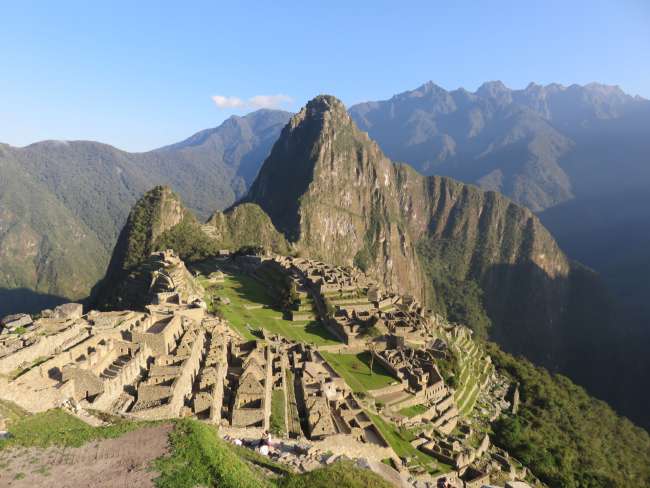
Rapports de voyage Pérou
